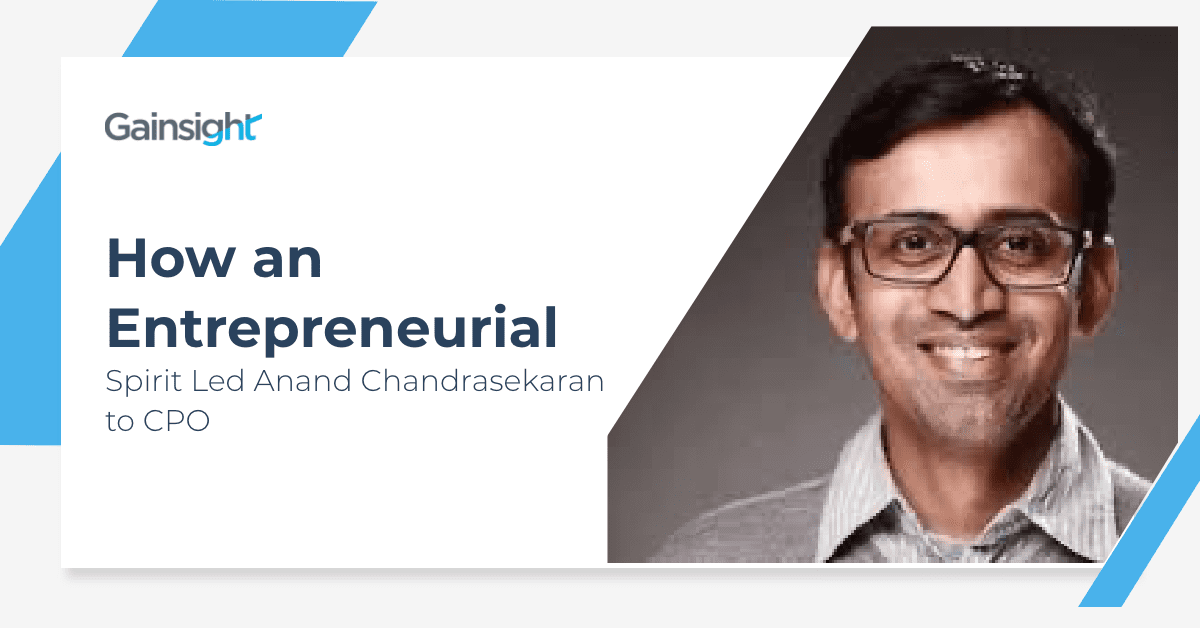Being in tune with your career observations, work environment, and the industry’s current ebb and flow is necessary for anyone looking to make headway in the employment journey. Often, one is merely waiting for the opportunity to show, hoping that some kind of fate lends a hand. Luck may play some role, but life is not a drift. This is a theme throughout Gainsight’s Path to CPO series, hosted by CEO Nick Mehta.
Recently, Nick sat with Anand Chandrasekaran, Chief Product Officer and Executive Vice president of Product Management at Five9, a leading cloud-based contact center software.
Determination of One’s Path
Like so many others interviewed in the CPO series, Anand’s journey is not a traditional one. His career path did not begin in Silicon Valley. A native of India, he attended graduate school in northern California, partly inspired by the book called ‘Only the Paranoid Survive’ by Andy Grove. Like so many who come to the United States, Anand found himself drawn by the ability to determine his path. “There was this fantastic notion that your talent and your merit alone can drive your success as opposed to where you were born or the kind of family you were in.,” Anand shared. That sense of determination also found him “bitten by the entrepreneurial bug” once he left grad school in 2000. However, Anand confessed that getting started was not easy. “No one told us that it was the worst time in twenty-five years to start a business.” Despite the challenging environment, he forged ahead by starting a company called Aeroprise.
Anand gravitates towards candidates with an entrepreneurial spirit. He sees it in others and identifies it as the “tie-breaker” between candidates. “If you have two great candidates, generally someone who has done entrepreneurship in their life tends to exhibit the owner mentality a little bit more. You don’t want this to be a department, but a discipline that works well with the other disciplines in the company. I think entrepreneurship just teaches you that in a very intuitive way, that reading a lot of books about it may not do.”
Commerce, Customer Care, and Content
Anand realized that his path to Product happened in a “backward” way. He was involved in so many various roles, and the ones he repeated the most were those as a product manager, even though he hadn’t identified it yet. Anand found himself latched on to a product. It began with his company Aeroprise being acquired by a Texas-based company, BMC. He was offered an attractive opportunity to be a part of one of the world’s ten largest software companies. Then, Apple announced the launch of the iPhone, and within a year, the App store was born. In his real entrepreneurial vision, Anand had foresight. Whether from a career or product perspective or both, he saw that the wireless-mobile industry was the future for him. That is when he decided against BMC and went straight after consumer product development.
As Anand transitioned from position to position, he realized that he was drawn to opportunities that others might not see the promise in. They were instinctual and organic decisions. “It was a great coming together of both where my career was going as well as where we were in the industry,” Anand explained. “Usually, I find that good moves are when those two come together in an intuitive, organic way.” Anand discovered that where he was progressing was to focus hard on customer centricity and care as a use case, as part of a messenger platform. That focus put every conversation and motion around three major subjects: commerce, customer care, and content. With every transformation in Anand’s career, his vision coincided with a change in business tech. This time it was the melding together of experience and product— now known as customer success.
Product, Customer Experience, and SaaS
What was clear to Anand was that there needed to be an alignment between the product and the customer experience. They missed the recognition that development cycles in the product were shortening and the industry was transitioning. They were going from months to weeks where a prototype could be launched, which brought excitement to see a product take root and grow. But it was the customer and their experience that caught his imagination in the process.
It was midway through Anand’s enterprise experience that he desired to have direct feedback from the customer. For him, the voice of the customer needed to be crucial to product development. “I found myself latching on to talking to customers,” Anand explained, “trying to find out what they wanted to do next with a product and then going back and either building it myself or working with our engineering team to do that.” He was drawn away from unrelated activities and focused on this path, but found that it often conflicted with executives’ desires. Anand’s intuitive prompts convinced him there was something to the VOC and developed a discipline around its analysis, which led him to his current seat.
Advice for the Future CPO
If it wasn’t apparent, Anand is inherently curious and trusts his intuition. He terms it as the “atomic unit of value” for a product. He likes to discover critical insights about individuals by what they do outside of work, as well. While he believes in some tech proficiency, the balance between technology and life allows a window into how their curiosity influences career spheres. Without that curiosity, he believes product managers often hit a plateau in growth. He also stresses that humility is important—that you know that you don’t know everything. That hunger for more contributes to a growth mindset and a desire to contribute more to your team.
Being the Better Leader
The second part of Anand’s advice was about being the best leader you can be and the environment you want to create. There are varying management skills and styles. Anand found his style was akin to a manager at Yahoo who took him under his wing and guided him in leadership.
There is a temptation to be loyal to your company, solution approach, and product, especially if you were promoted through the ranks. Often, people become over-protective of the products built and manage because they are too close. This can be “the difference between really successful and even average or not so successful.” Hard and fast loyalty should be to the problem statement rather than a one solution approach. Instead, incorporate that same “big picture” vision for other perspectives and objectivity, realizing you are still creating a product that solves issues and makes a great experience.
Often, being at a company too long creates a false sense of loyalty to the culture. “Increasingly, when you’re at the company, you drink the Kool-Aid, and you’re part of the culture,” Anand explained. “That’s why you’re part of the team. But you should have the objectivity to say still, the emperor has no clothes.” Find a way to accomplish this without causing complete conflict while balancing proper leadership.
The second piece of leadership advice Anand shared pointed back to humility. “As a product manager, one temptation is that you show up in a room, say something and blow everyone away, like you always want to be the smartest person in the room.” Anand counseled against it, saying, “it can become a crutch.” He advised on concentrating on making yourself better at what you do and who are one percent every day. Incremental progress is better than making a huge statement or accomplishing one big goal and then being stagnant for a long time. By concentrating on this process, Anand has found it prevents people from becoming frustrated and burned out on their jobs. As a leader, you can also include that into a team member’s professional growth plan of reaching incremental goals with periodic challenges, rather than overreaching for goals that seem impossible. Become a solution-oriented team member and leader.
There are crucible moments in everyone’s career path, and Anand is proof of that. Combining ability, a desire for growth, an innate curiosity, and trusting your foresight can only prove useful. It will also prove to those around you that you are trustworthy of responsibility and a critical part of any company. But as stated before, don’t wait around for an opportunity to present itself. Be proactive and humble, ready to take advantage of what comes your way.

